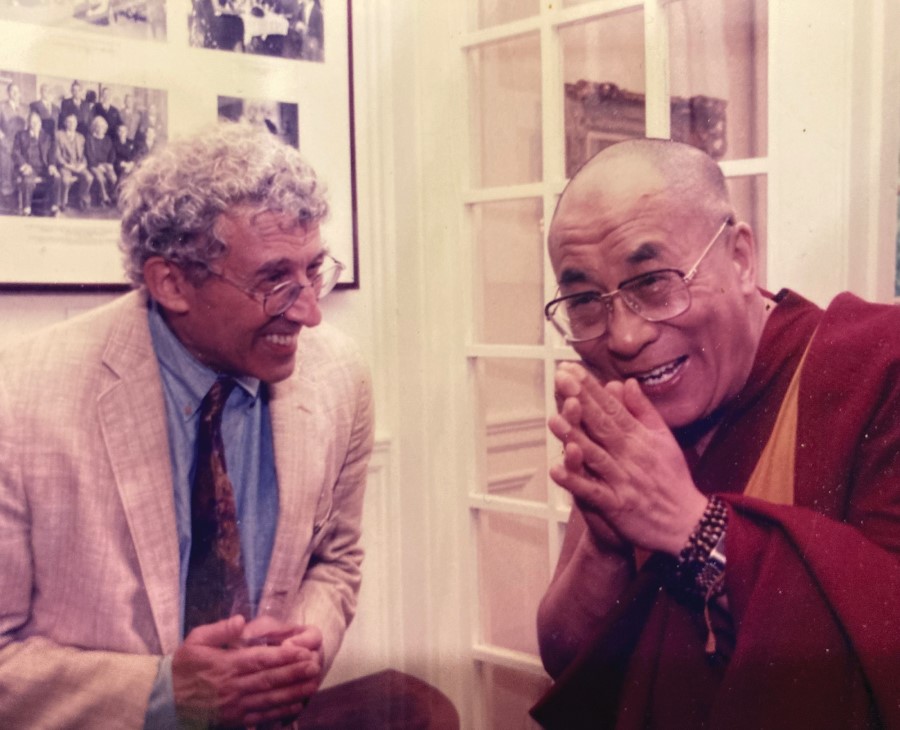In his book Rambo and the Dalai Lama: The Compulsion to Win and Its Threat to Human Survival, sociologist Gordon Fellman described two contradictory kinds of human relations. In the adversarial paradigm, he wrote, “most encounters have been organized so that the point of them is to overcome the other”; in the mutuality paradigm, the “assumption is that the other can be a friend, a colleague, an ally.”
Fellman dedicated his professional life to the proposition that adversarial relations can be transformed into relations of mutuality. “In order to survive adversarial forms of onslaught,” he wrote, “mutuality will need to become the primary governing paradigm in human affairs.”
Fellman, who was known as Gordie, died at Mount Auburn Hospital in Cambridge on Oct. 19, 2022 after a sudden hemorrhage. He was 88.

For nearly 60 years, he was a “stalwart member of the sociology department and a teacher who inspired devotion from generations of students,” Brandeis University Provost Carol Fierke wrote.
The son of Charles and Rose (Shyken) Fellman, Gordie was born on May 10, 1934 in Omaha, Nebr. His father owned a small grocery store.
Gordie graduated in 1952 from North High School in Omaha, where “he led anything he had a chance to lead,” said his wife, Pamela Blau. He was a star on the debate team, president of the local Red Cross, and student council president. His life changed, Pamela said, when he enrolled at Antioch College in Yellow Springs, Ohio. Meeting students from liberal East Coast families awakened Gordie’s social awareness and inspired his lifelong activism.
As part of a multiracial group of Antioch students, he protested segregation at Yellow Springs businesses, including a barber shop and movie theater. Forced to shut down for a few days, the theater reopened with no restrictions. Gordie graduated from Antioch in 1956.
That same year he began graduate study in sociology at Harvard, where he worked with the renowned developmental psychologist Erik Erikson. After completing his Ph.D., Gordie became assistant professor of sociology at Brandeis, getting his “dream job,” as he put, “on the first try.”
He chaired the sociology dept. twice and was a cofounder and chair of the interdisciplinary Peace, Conflict, and Coexistence Studies Program. His most famous course, called the Sociology of Empowerment, helped students become aware of their own social position.
In 1999, he won the Louis Dembitz Brandeis Prize for Excellence in Teaching and, in 2007, the Student Union Best Teaching Award. In 2021, Gordie was given the Peace Educator-Scholar Award by the Peace and Justice Studies Association.
He was a part of several key moments in Brandeis history. In 1969, he climbed through a window to meet with Black students who had occupied Ford Hall to press for an African-American studies program and more Black representation on the faculty. In 1970, he supported the national student strike. In the 1980s, Gordie was active in the American anti-apartheid movement and opposed university investments in South Africa.
In spring 1998, he and about 35 members of Brandeis Students for a Free Tibet conducted Seven Weeks on Tibet, which culminated with the Dalai Lama’s visit to Brandeis. Later that year, he published his book on the compulsion to win.
His creativity was unstoppable. In 2018, he published “Sociology and Psychoanalysis in the Liberal Arts” in the International Forum of Psychoanalysis. Its purpose was to show students “how self and society are intertwined in a condition of mutual crisis in contemporary society.”
Gordie’s professional obligations and engagement with social causes demanded all his time. It was not until 1999, at age 65, that through a mutual friend he met Pamela Blau, a classical musician with a diploma from the C.G. Jung Institute in Zurich who had recently returned after 17 years in Europe.
The two had much in common, including a desire for a family and a deep connection to Wellfleet. They were engaged within six months and married soon after — Pamela joked that she had landed the most eligible bachelor in Cambridge. They adopted their son, Ezra, in 2001 and daughter, Talia, in 2003.
Gordie had early on spent a winter sabbatical in Eastham. That experience stayed with him and, in the 1990s, he rented a small cottage on Wellfleet’s Nauhaught Bluff Road for winter break. Because her mother owned a summer house near Newcomb Hollow Beach, Pam had been spending time in Wellfleet for most of her life.
As a family, Gordie, Pam, Ezra, and Talia spent weeks in Wellfleet each summer, building bonfires on Fourth of July weekends, participating in recreation programs, and feeling pleasantly torn between the winter bayside rental and the summer house by the sea. Brief as it was, Gordie’s dream of a warm family life came true.
After his retirement, compelled partly by the pandemic, Gordie wanted to write a book about climate change and to learn to play piano. Inaction was never an option.
Gordie is survived by his wife, Pamela, and his children, Ezra and Talia, of Cambridge and Wellfleet.
A memorial service was held at Brandeis on Oct. 24.



